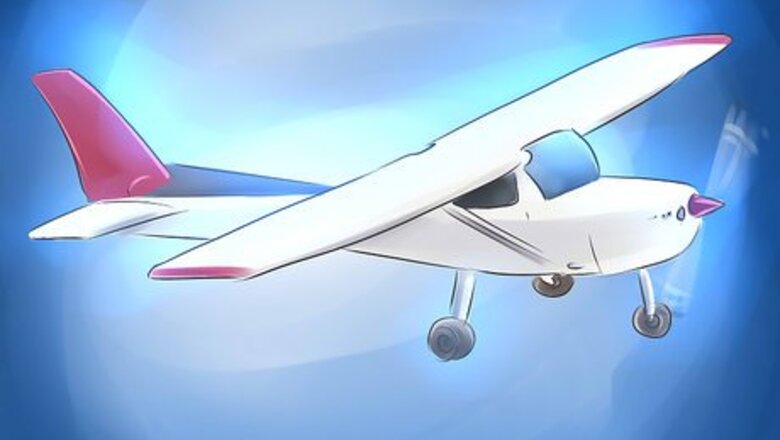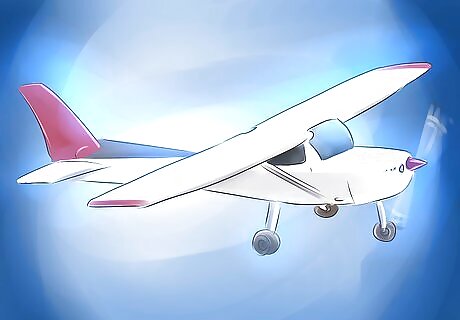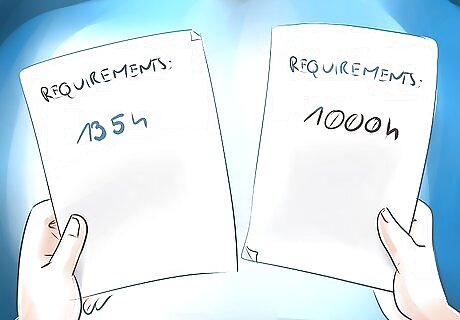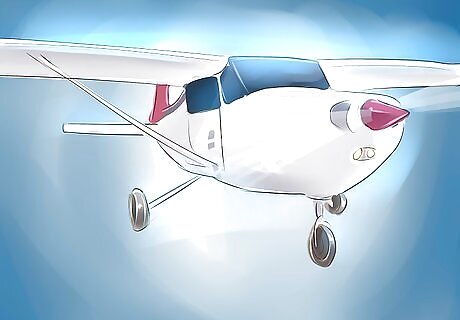
views

Log 500 hours of flight time. To fly as pilot-in-command under FARs Part 135 requires a minimum of 500 hours of flight time. Of that 500 hours, 100 hours has to be cross-country time. And of that 100 hours, 25 hours has to be night cross-country time. How does the FAA define cross country time? The explanation below was originally posted by the Office of the Chief Counsel, FAA: "Cross country flight time is defined as time acquired during a flight that includes a point of landing that is at least a straight-line distance of more than 50 nautical miles from the original point of departure, not the original point of any flight leg. There is no requirement that any specific leg must be 50 nm. Moreover, a cross-country flight may include several legs that are less than a straight-line distance of more than 50 nm from the original point of departure. Nevertheless, at least one leg of the cross-country flight, however long by itself, must include a point of landing that is at least a straight-line distance of more than 50 nm from the original point of departure." In other words, each cross-country flight used to meet the aeronautical experience requirements under 14 CFR 61.1(b)(3) must include one leg that includes a landing that is at least a straight-line distance of more than 50 nm from the original point of departure.

Be aware that different companies have different requirements. The reality is that there are some Alaska operators who will hire a pilot with just the Part 135 minimums of 500 hours. But, most Alaska operators require 1000 hours or more in a new hire. Many of them also prefer to see some Alaska time or equivalent i.e. mountain time and/or Pacific Northwest time. For the most part, insurance companies are responsible for these pilot-employment requirements.

Build time by giving flight instruction. If you're a low-time commercial pilot and want to build flight hours toward an eventual Alaska flying job, the best way is to give flight instruction. There are several flight schools in Alaska. A couple of them specialize in bush flying techniques. The others are geared toward gaining the desired licenses and ratings. With CFI or CFI-I certification, you could land a job with an Alaska flight school. This is a great way to build up some Alaska time. If you decide to acquire CFI or CFI-I certification from an Alaska-based flight school, there is the possibility that the school would hire you to give flight instruction. Teaching at an Anchorage-based flight school might be the best route toward your getting a regular flying job. The reason being, that the Anchorage area has the biggest aviation community in the state and you would get to know people who would be in a position to help you find that job when you have logged enough flight time. You would also learn a bunch more than you already know by giving instruction. And as you got to know more fellow aviators, you might also learn a lot about which companies are really cool to work for and which ones may not be so cool.

Start your first Alaska flying job in Bethel. The town of Bethel is one of the Alaska locations where pilots new to Alaska obtain their first flying job. There is a fairly high turnover of pilots in Bethel because it is not an ideal place to live for most pilots. Nevertheless, Bethel is the main aviation hub for more than 50 villages within the greater Yukon-Kuskokwim delta area. Flying out of Bethel is busier during the winter months than in the summer and is consequently a year-round job. Most of the flights in and out of Bethel are not tourism-related, but primarily provide mail/ cargo delivery and transportation for villagers travelling to and from other villages. During the summer months many villagers are employed in other parts of Alaska i.e. commercial fishing, mining operations, and other Alaska industries.

Take the additional actions necessary if you're a foreign pilot. Pilots from countries other than the USA would be required to have Federal Aviation Administration (FAA) commercial license and a work visa to be legally employed as a pilot in Alaska or anywhere else in the US. Under current FAA regulations, a JAA pilot license of any level (private, commercial, or ATP) will convert only to a FAA private pilot certificate. To convert a JAA commercial license or ATP license to the equivalent FAA license requires passing FAA written, oral and practical test.

Begin a serious job search with face-to-face interviews and trim your cover letter and resume to one page. When the time comes to begin a serious job search, the most effective way is face-to-face meetings with Chief Pilots, owners, or Directors of Operations (whoever does the hiring of pilots). In a face-to-face interview for an Alaska flying job, you should dress neatly, but not in a suit and tie. This would require a trip to Alaska if you're living elsewhere and would require some careful planning to optimize your time and expense. Anchorage or Fairbanks would be the best places for launching a face-to-face job hunt. If you are unable to plan a trip to Alaska, then the next best method is by sending out cover letters and resumes. A one-page cover letter should be tailored specifically to each company you're contacting. If possible it should include words indicating that you know quite a lot about the company.

Be prepared for interviews by doing your homework first. Company websites are good sources of information. Your one-page-only resume can be more generic but you might consider tailoring your "Objective" to each individual company. Do some research on effective resume writing. Alaska air taxi operators are mostly interested in your flying experience and in any previous employment as a pilot. So, unless you think it is truly relevant to a prospective employer, your previous work history that is not related to flying is best excluded or at least minimized. An exception to that might be citing exceptional skills in dealing with customers. A college degree is not as important for a bush flying job as flying experience.















Comments
0 comment